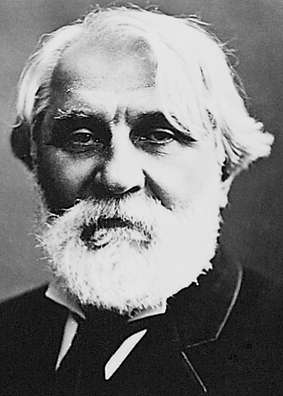| Ivan Turgenev  AKA Ivan Sergeevich Turgenev AKA Ivan Sergeevich Turgenev
Born: 9-Nov-1818
Birthplace: Oryol, Ukraine, Russia
Died: 3-Sep-1883
Location of death: Bougival, France
Cause of death: unspecified
Remains: Buried, Volkoff Cemetery, St. Petersburg, Russia
Gender: Male
Race or Ethnicity: White
Sexual orientation: Straight
Occupation: Author Nationality: Russia
Executive summary: Fathers and Sons Russian novelist, the descendant of an old Russian family, was born at Orel, in the government of the same name, in 1818. His father, the colonel of a cavalry regiment, died when our author was sixteen years of age, leaving two sons, Nicholas and Ivan, who were brought up under the care of their mother, the heiress of the Litvinovs, a lady who owned large estates and many serfs. Ivan studied for a year at the university of Moscow, then at St. Petersburg, and was finally sent in 1843 to Berlin. His education at home had been conducted by German and French tutors, and was altogether foreign, his mother only speaking Russian to her servants, as became a great lady of the old school. For his first acquaintance with the literature of his country the future novelist was indebted to a serf of the family, who used to read to him verses from the Rossiad of Kheraskov, a once celebrated poet of the eighteenth century. Turgenev's early attempts in literature, consisting of poems and trifling sketches, may be passed over here; they were not without indications of genius, and were favorably spoken of by Bielinski, then the leading Russian critic, for whom Turgenev ever cherished a warm regard. Our author first made a name by his striking sketches "The Papers of a Sportsman" (Zapiski Okhotnika), in which the miserable condition of the peasants was described with startling realism. The work appeared in a collected form in 1852. It was read by all classes, including the emperor himself, and it undoubtedly hurried on the great work of emancipation. Turgenev had always sympathized with the muzhiks; he had often been witness of the cruelties of his mother, a narrow-minded and vindictive woman. In some interesting papers contributed to the "European Messenger" (Viestnik evropy) by a lady brought up in the household of Mme. Turgenev, sad details are given illustrative of her character. Thus the dumb porter of gigantic stature, drawn with such power in Mumu, one of our author's later sketches, was a real person. We are, moreover, told of his mother that she could never understand how it was that her son became an author, and thought that he had degraded himself. How could a Turgenev submit himself to be criticized?
The next production of the novelist was "A Nest of Nobles" (Dvorianskoe gniezdo), a singularly pathetic story, which greatly increased his reputation. This appeared in 1859, and was followed the next year by "On the Eve" (Nakanunge) -- a tale which contains one of his most beautiful female characters, Helen. In 1862 was published "Fathers and Children" (Otzi i Dieti), in which the author admirably described the nihilistic doctrines then beginning to spread in Russia. According to some writers he invented the word "nihilism." In 1867 appeared "Smoke" (Dīm), and in 1877 his last work of any length, "Virgin Soil" (Nov). Besides his longer stories, many, shorter ones were produced, some of great beauty and full of subtle psychological analysis, such as Rudin, "The Diary of a Useless Man" (Dnevnik lishnago chelovieka), and others. These were afterwards collected into three volumes. The last works of the great novelist were "Poetry in Prose" and "Clara Milich", which appeared in the "European Messenger."
Turgenev, during the latter part of his life, did not reside much in Russia; he lived either at Baden Baden or Paris, and chiefly with the family of the celebrated singer Viardot Garcia, to the members of which he was much attached. He occasionally visited England, and in 1879 the degree of D.C.L. was conferred upon him by the university of Oxford. He died at Bougival, near Paris, on the 4th of September 1883.
Unquestionably Turgenev may be considered one of the great novelists, worthy to be ranked with Thackeray, Dickens and George Eliot; with the genius of the last of these he has many affinities. His studies of human nature are profound, and he has the wide sympathies which are essential to genius of the highest order. A melancholy, almost pessimist, feeling pervades his writings, a morbid self-analysis which seems natural to the Slavonic mind. The closing chapter of "A Nest of Nobles" is one of the saddest and at the same time truest pages in the whole range of existing novels.
The writings of Turgenev have been made familiar to persons unacquainted with Russian by French translations. There are many versions in English, among which we may mention the translation of the "Nest of Nobles" under the name of "Lisa", by Ralston, and "Virgin Soil", by Ashtoil Dilke. There is also a complete and excellent translation by Mrs. Garnett.
Father: (cavalry officer)
University: University of Moscow
University: University of St. Petersburg
Do you know something we don't?
Submit a correction or make a comment about this profile
Copyright ©2019 Soylent Communications
|